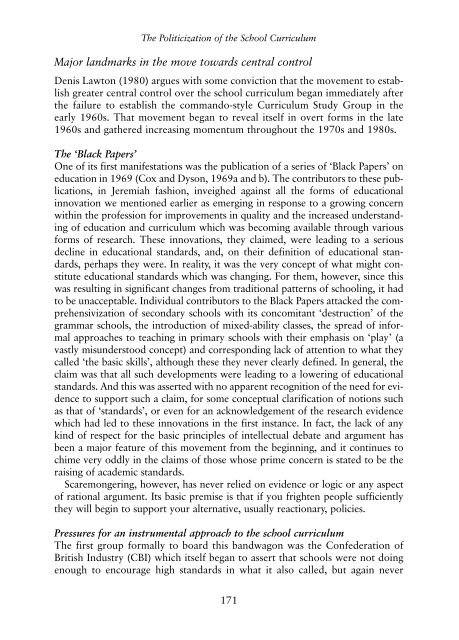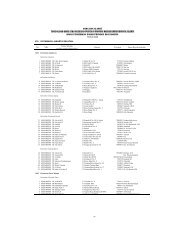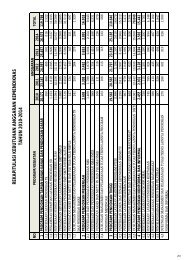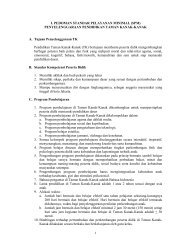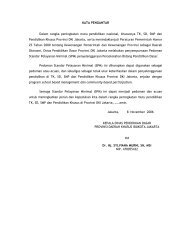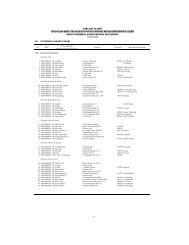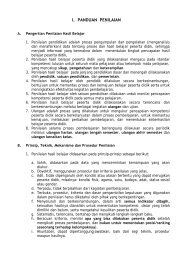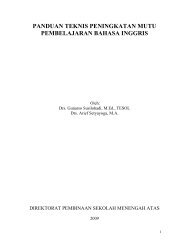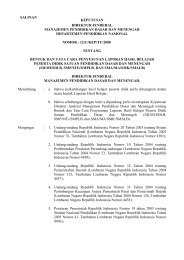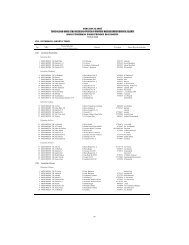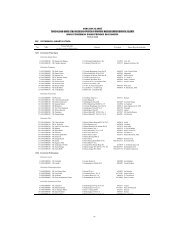The Curriculum - WordPress.com
The Curriculum - WordPress.com
The Curriculum - WordPress.com
You also want an ePaper? Increase the reach of your titles
YUMPU automatically turns print PDFs into web optimized ePapers that Google loves.
<strong>The</strong> Politicization of the School <strong>Curriculum</strong>Major landmarks in the move towards central controlDenis Lawton (1980) argues with some conviction that the movement to establishgreater central control over the school curriculum began immediately afterthe failure to establish the <strong>com</strong>mando-style <strong>Curriculum</strong> Study Group in theearly 1960s. That movement began to reveal itself in overt forms in the late1960s and gathered increasing momentum throughout the 1970s and 1980s.<strong>The</strong> ‘Black Papers’One of its first manifestations was the publication of a series of ‘Black Papers’ oneducation in 1969 (Cox and Dyson, 1969a and b). <strong>The</strong> contributors to these publications,in Jeremiah fashion, inveighed against all the forms of educationalinnovation we mentioned earlier as emerging in response to a growing concernwithin the profession for improvements in quality and the increased understandingof education and curriculum which was be<strong>com</strong>ing available through variousforms of research. <strong>The</strong>se innovations, they claimed, were leading to a seriousdecline in educational standards, and, on their definition of educational standards,perhaps they were. In reality, it was the very concept of what might constituteeducational standards which was changing. For them, however, since thiswas resulting in significant changes from traditional patterns of schooling, it hadto be unacceptable. Individual contributors to the Black Papers attacked the <strong>com</strong>prehensivizationof secondary schools with its con<strong>com</strong>itant ‘destruction’ of thegrammar schools, the introduction of mixed-ability classes, the spread of informalapproaches to teaching in primary schools with their emphasis on ‘play’ (avastly misunderstood concept) and corresponding lack of attention to what theycalled ‘the basic skills’, although these they never clearly defined. In general, theclaim was that all such developments were leading to a lowering of educationalstandards. And this was asserted with no apparent recognition of the need for evidenceto support such a claim, for some conceptual clarification of notions suchas that of ‘standards’, or even for an acknowledgement of the research evidencewhich had led to these innovations in the first instance. In fact, the lack of anykind of respect for the basic principles of intellectual debate and argument hasbeen a major feature of this movement from the beginning, and it continues tochime very oddly in the claims of those whose prime concern is stated to be theraising of academic standards.Scaremongering, however, has never relied on evidence or logic or any aspectof rational argument. Its basic premise is that if you frighten people sufficientlythey will begin to support your alternative, usually reactionary, policies.Pressures for an instrumental approach to the school curriculum<strong>The</strong> first group formally to board this bandwagon was the Confederation ofBritish Industry (CBI) which itself began to assert that schools were not doingenough to encourage high standards in what it also called, but again never171


